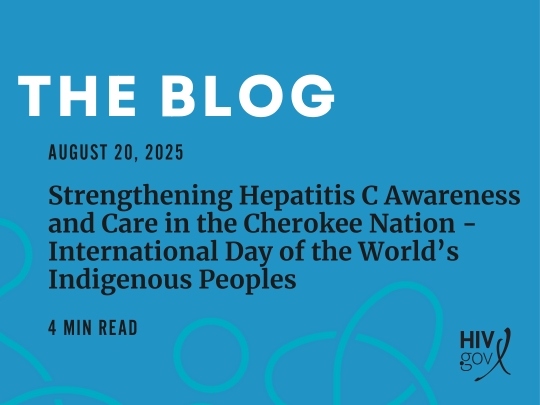Strengthening Hepatitis C Awareness and Care in the Cherokee Nation - International Day of the World’s Indigenous Peoples

August brings renewed focus to Indigenous health and the needs of Indigenous communities throughout the world as we marked the International Day of the World’s Indigenous Peoples on August 9.
While these communities make up less than 2 percent of the U.S. population, they continue to experience disproportionate health burdens. For example, the Centers for Disease Control and Prevention (CDC) reports that in 2023, non-Hispanic American Indian/Alaska Native (AI/AN) people had higher rates of acute hepatitis C virus (HCV) among any racial or ethnic group. The rate of acute HCV in non-Hispanic AI/AN populations was 2.4 times higher than non-Hispanic White people. Without treatment, HCV can be fatal or have harmful health effects on the liver, but with treatment, more than 95 percent of people with HCV are cured by taking pills for 8 to 12 weeks.
The International Day of the World’s Indigenous Peoples offers an important opportunity to highlight the need for AI/AN communities to get more access to HCV testing and treatment. Let’s explore an example of a program that’s making strides to eliminate HCV in an Indigenous community:
Leading the Way: How the Cherokee Nation Is Working to Eliminate HCV
Nearly 10 years ago, Cherokee Nation Health Services launched a program to help eliminate HCV in its Indigenous communities. Here are two ways the program helps its community members:
- Community-Based Testing: The Cherokee Nation’s reservation spans 14 counties in northeastern Oklahoma and is home to approximately 141,000 residents. The reservation has seven designated food distribution centers that serve households in need. The HCV elimination program brought free screenings for HCV, syphilis, cholesterol, and blood sugar directly to these sites, making testing more convenient for community members. Most participants reported feeling comfortable with this approach and described the testing process at food distribution centers as “very easy.”
- Expanding Access: Cherokee Nation Health Services also launched the HCV Engagement and Linkage to Program (also known as HELP) to further expand access to HCV and other health screenings and care within the reservation. The HELP initiative provides HCV testing and connects people who test positive to health care providers through telehealth. That makes it easier for them to access care and stay engaged in treatment that can cure HCV.
In addition, the HCV elimination program has implemented universal HCV screening and rapid point-of-care tests. The program also leveraged Project ECHO, which builds clinical knowledge and skills among local health care providers to help more people access health resources and improve health outcomes. The program expanded and supported the HCV primary care workforce and trained and engaged dedicated patient navigators, case managers, and community health workers. These activities have been supported by tribal leadership, the Oklahoma State Health Department, the HHS OIDP, and more.
In the first 5 years of the HCV elimination program, the Cherokee Nation linked over 1,200 people diagnosed with HCV to medical care, and 99 percent of those who finished their treatment were cured.
Read our recently published World Hepatitis Day blog to learn more about combatting hepatitis and follow the HIV.gov blog for more updates.
Looking for hepatitis testing or treatment? Visit HIV.gov’s Services Locator to find care and resources near you.